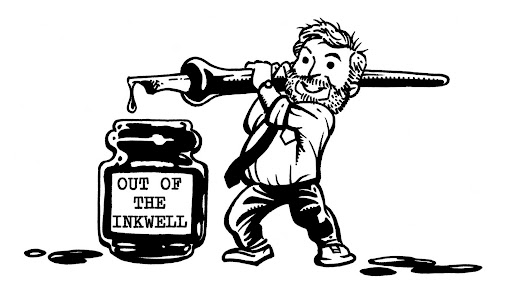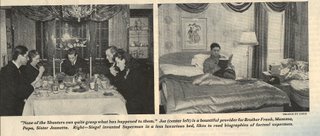


I've meant to post something about our trip to Scotland Mary and I took in March, but haven't gotten around to it until one of our publications at work needed a travel piece. There's lot more I could add and I include more material for this post. The first image is yours truly at Castle Doune. The second image is from Edinburgh. Frequent readers of this blog will understand why I took it! The third is the Wallace Memorial as seen from Stirling Castle.
It's a mid-March day in Edinburgh and the snow is blowing sideways on the windshield of our taxicab.
It's springtime in Scotland.
As our cabbie negotiated the medieval streets of the capitol of Scotland, there are signs that spring is actually here - there are flowers in bloom everywhere.
This is my second trip to Scotland - my wife was born in Glasgow and raised in Paisley - and we have the advantage of having generous and hospitable relatives to put us up and give us sight-seeing advice.
Even if we didn't have this wonderful resource, Scotland would still be a relaxing destination. Scots are friendly, the mass transit is abundant and easy to use and there are tourist information centers with plenty of information.
We crammed as much as we could in the period of 12 days. If you're planning a trip to the United Kingdom, give yourself a treat and spend some time in Scotland.
Edinburgh
The capitol of the nation is by far one of most tourist friendly spots I've ever visited. There is a tourist information center in the center of the city on Princes Street near the huge spire that is a memorial to Sir Walter Scott.
The biggest tourist spot is the Royal Mile, the street that begins on the top of a hill and the site of Edinburgh Castle and ends at the Holyrood House where the British royal family stays when they're passing through.
Undoubtedly the best known attraction in the city, Edinburgh Castle is a feast for any history, military or architecture buff. Expect to spend the better part of several hours at the castle.
Tourist Tip Number One: When at the castle, don't ask when the famed one'o'clock gun is fired.
Walking down the Royal Mile you see a wide variety of shops with their guns aimed squarely at tourists. Frankly I enjoy these kinds of shops, as they are the source for all of items you're going to bring home to family and friends.
Off the Royal Mile, on Chambers Street, are the Royal Museum and the Museum of Scotland, two museums in two joined buildings. Admission is free and the museums house wonderful exhibits on the history of the nation as well as decorative arts, archeology and the natural world.
There is a great cafe in the center of the two museums, which is an ideal place to relax after a day of walking. Keep your eyes peeled, here: Harry Potter author J.K. Rowling is a regular. Our friends who were traveling with us actually had a sighting!
Tourist Tip Number Two: Always keep a 20 pence coin or two 10 pence coins with you for the pay toilets.
Across from the museums is the Greyfriars Kirkyard and the resting place of Greyfriars Bobby, a Skye terrier who watch over his master's grave for 14 years and was adopted by the city of Edinburgh.
The Greyfriars Pub is outside the gate of the cemetery and features a haggis sampler. Go ahead and try it. The national dish of Scotland - actually just a mixture of mutton, oats and spices - has a bad reputation, but is quite good, specially when eaten with the traditional mashed potatoes and turnips or tatties and neeps.
Tourist Tip Number Three: When in a Scottish pub, don't order "Scotch." In Scotland it's just whiskey. And you might not find your brand there as much of what we drink here is only available for export.
Glasgow
Just a quick 45-minute train ride away is the largest city on the nation. If Edinburgh is like New York - a flashy tourist destination - then Glasgow is like Chicago. It's a great city with plenty to see and do that some folks just don't think about.
We arrived on a Saturday afternoon and spend most of it just walking through the bustling downtown. That's right. I did just write the word "bustling," "Saturday afternoon" and "downtown" together. In many American cities, down towns are dead on the weekend, but in Glasgow shopping malls haven't sucked the life out of urban areas.
Sauchiehall Street is a blast with great shops, restaurants and pubs. We walked into pub and found a six piece jazz band playing up a storm - something you'd never see on an afternoon in an American bar.
Tourist Tip Number Four: There is a substantial difference in language between Edinburgh and Glasgow, largely thanks to the "Glesgie patter," or slang. As long as they don't call you an "eejit" you're okay.
There are great museums in Glasgow - 13 in fact - ranging from Museum of Transport to the Burrell Collection of paintings, furniture, textile and sculpture to the magnificent Kelvingrove Art Gallery and Museum. Admission is free to the museums, which is helpful on a tight tourist budget.
Other sights
Stirling Castle, in the village of Stirling, is in Braveheart country. This is the second most important castle in the country and is well worth the scenic drive into the foothills of the Highlands.
Aberdeen is known as the "Granite City," and for a very good reason - most of the buildings are made from the native material. It's far from a "grey" town, though thanks to the large student population as well as a hustle and bustle from its large port.
If you love chocolate Scotland is the place to be. Here's words to look for: Cadbury's ( the real stuff...not what we get here) and Tunnock's. I'm in love with the Tunnock's line of wafers and tea cakes. Fabulous!
In Glasgow we found a non-touristy restuarant chain called Jake McPhees (pretty sure of thespellingg) where a slightly surly waitress reminded me that beans come on top of Scotch Pies. I told her I was not stranger to Glasgow and knew that. She seemed a little surprised and was then less surly! We also tried a fish and chip platter ( I know stereotypicall foods, but these you have to try in a foreign country) and it was, as the folks in Glasgow say, "magic."
We loved shopping at Govan market, an outdoors event in a very hard-core section of the city. The stalls sell everything from baked goods to carpeting and I loved watching the portable butcher shop conduct a television-style informerical– holding up various cuts of meat, describing it and talking about the price. The broken glass and dog shite on the sidewalk made me feel at home!
The underground in Glasgow is a dream for the tourist. Much cheaper than a cab, the subway line is a big cricle through the city. If you miss your station, don't worry, you'll get back to it eventually.
For film nuts such as myself, the best place to get DVDs is Fopp, a British chain that features a vast selection at the lowest prices I've seen. Get yourself an all-region player before you go to UK and then hunt down a Fopp.
For me, though, the best moment is when I could walk around Doune Castle, just minutes away from Stirling in the village of Doune. This is where Monty Python filmed much of their second film Monty Python and The Holy Grail. If you're quiet enough, you can still hear the clapping of coconut shells. We' re too late for a tour, so I walked around the castle and picked up a bit of masonry that had fallen on the pathway.
As always we are indebted to wife's Scottish relatives for their unlimited hospitality.
Tourist Tip Number Five: One trip to Scotland isn't enough.
© 2006 by Gordon Michael Dobbs. Yes, I used the word "shite." I take responsibility.




